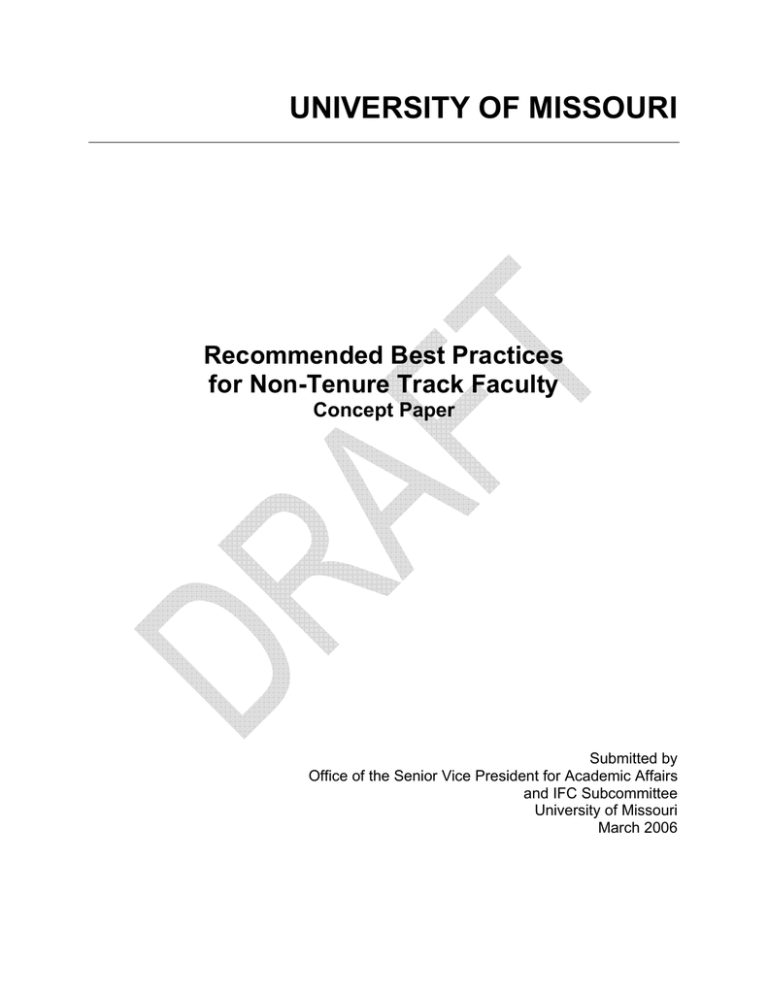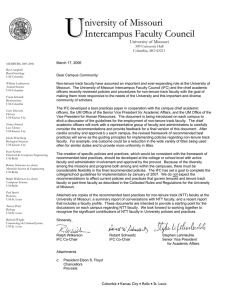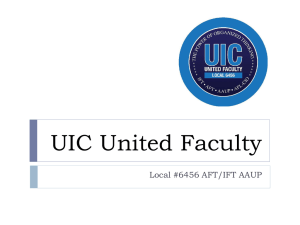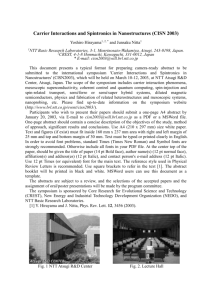UNIVERSITY OF MISSOURI Recommended Best Practices for Non-Tenure Track Faculty
advertisement

UNIVERSITY OF MISSOURI Recommended Best Practices for Non-Tenure Track Faculty Concept Paper Submitted by Office of the Senior Vice President for Academic Affairs and IFC Subcommittee University of Missouri March 2006 Introduction and Background Non-tenure track faculty members play an increasingly important role at the University of Missouri. While their contributions are significant, their roles and duties vary widely across the four campuses. In many cases there are significant inconsistencies in titles, salary, responsibilities and involvement in campus decision-making. Approximately two years ago, the Inter-Campus Faculty Council (IFC) began to examine the status of non-tenure track faculty at the University of Missouri. They identified a number of issues that must be addressed to provide some consistency in their roles and to explore other critical issues for the University’s future workforce. Simultaneously, the chief academic officers at each campus expressed the need to ensure that the contributions of non-tenure track faculty were being appropriately recognized and rewarded. To attend to these questions, IFC appointed a subcommittee to address the issue of non-tenure track academic appointments at the University of Missouri. Working with the senior staff in the Office of the Senior Vice President for Academic Affairs, they gathered data on the current nature of faculty appointments at the University, surveyed the national literature on this category of faculty, and developed some general guidelines regarding non-tenure track faculty and the important role this group of faculty performs at the University. This concept paper addresses two of the major issues raised by the IFC non-tenure track faculty subcommittee: 1. Are there more effective ways to classify non-tenure track faculty, as a whole or in groups? a. Specifically focus on titles (i.e., Asst. Teaching Professor) and classification for this group of faculty (i.e., Non-Tenure Track ) b. Specifically focus on the human resource infrastructure necessary to support the non-tenure track faculty (i.e., contract lengths, leaves, dismissal, discontinuance of contract, etc.) 2. What are the rights and responsibilities of non-tenure track faculty members, in light of the work they perform? a. Specifically focus on shared governance, access to resources, eligibility for awards, performance review criteria, and promotion policies A third question was raised by the IFC subcommittee: “What is an appropriate mix of faculty (regular and non-regular) given the strategic goals of the University and the needs of various stakeholders?” That question is not addressed in this paper. Instead, it should be discussed and defined by the faculty at the college or school level on each campus as part of a broader strategic planning process. Academic appointments at the University of Missouri currently are divided into two main categories; regular and non-regular. Under the proposed guidelines, regular faculty would be referred to as “tenured and tenure track” faculty, and this group will continue to include the traditional faculty of the institution. The suggestions in this proposal will 2 have no effect on policies and practices that govern tenured and tenure track faculty or part-time faculty as described in the Collected Rules and Regulations for the University of Missouri. The current non-regular category is too broad and fails to recognize the variety of roles and institutional relationships that characterize different faculty members who fall within this catchall category. It is therefore suggested that non-regular faculty be divided into three groups: (1) full-time, ranked, non-regular faculty (non-tenure track (NTT) faculty); (2) full-time, unranked, non-regular faculty (i.e., instructors, lecturers, etc.); and (3) parttime, non-regular faculty (adjunct faculty).This document only focuses on the first group, heretofore referred to as NTT faculty (see NTT Faculty Attributes section). While many of the full-time unranked non-regular titles will not be eliminated, it is implicit in the guidelines of this paper that the individuals that meet the qualifications for NTT faculty would receive an appropriate NTT faculty title as described in the following section. All adjunct faculty appointments would continue to be referred to as adjunct academic appointments. They would include part-time faculty, courtesy appointments, and other titles that the campuses need to articulate in the future. The title of visiting faculty will only be used for those faculty on temporary appointments. Non-Tenure Track Faculty Defined There would be four main types of full-time, ranked NTT faculty. They would each have primary responsibility in a single area: teaching, or research, or clinical practice, or extension activities. The titles would identify the area. Within each area, there would be three ranks: • Research faculty o Assistant Research Professor o Associate Research Professor o Research Professor • Teaching faculty o Assistant Teaching Professor o Associate Teaching Professor o Teaching Professor • Clinical faculty o Assistant Clinical Professor o Associate Clinical Professor o Clinical Professor • Extension faculty o Assistant Extension Professor o Associate Extension Professor o Extension Professor Unlike tenured and tenure track faculty, whose performance is evaluated based on their contribution to research, teaching, and service, the performance of NTT faculty should be judged on the single responsibility of the non-tenure track appointment as well as related service and professional activities. However, NTT faculty should be expected to 3 be engaged in professional development activities pertaining to the single responsibility defined by the category. There would be no prohibition for NTT faculty to be involved in multiple duties related to research, teaching, or service. However, evaluation of NTT faculty performance should relate only to the primary purpose of their appointment and not be based on all three criteria. Only tenured and tenure track faculty should be evaluated on all three criteria. CONSIDERATIONS FOR ESTABLISHING DEPARTMENT GUIDELINES REGARDING NTT FACULTY Contract Length NTT faculty may hold 9 or 12-month academic appointments. Contract lengths could be up to three years with the option of renewing a multiyear contract during the contract period. Decisions to renew contracts should generally be made in advance of the contract end date. Faculty who will not receive a contract renewal must be informed in writing of non-renewal status well in advance of the contract end date. Nature of the Initial Appointment The nature of the initial appointment to a non-tenure track position is important to both the candidate and the department. Therefore the candidate’s primary department should be fully engaged in defining the nature of the non-tenure track academic appointments. Since the candidate would be expected to contribute to the department’s core mission, specific job responsibilities and expectations should be explicitly stated in a written job description developed by the department chair in conjunction with an appropriate department committee. Searches for Non-Tenure Track Faculty Members Searches for NTT faculty should be conducted on a regional or national basis as appropriate with the involvement of a faculty-based search committee. The expectation is that candidates should be selected using a process somewhat similar to one used for tenure track faculty members with open interviews, presentations to division faculty, staff and students, and a full review of candidates’ dossiers. Student feedback is particularly important for all NTT teaching faculty. NTT Faculty Attributes The candidate for a NTT academic position should hold an earned doctoral degree, OR the appropriate terminal degree, OR have appropriate professional experience (i.e., teaching, research, clinical or extension) as defined by the faculty of the academic unit. Evidence of the candidate’s abilities should be demonstrated through the candidate's resume, portfolio/dossier, reference letters, and through interviews with department and college faculty members. The candidates should demonstrate potential for excellence in the area of their appointments (e.g., teaching, clinical practice, extension, or research) as well as in the service and professional aspects related to the discipline and the position. 4 Clearly Defined Expectations for Each Position Specific qualifications for each rank will be determined by the department and/or college with approval by the provost. The workload requirements for NTT faculty members should be spelled out in detail and agreed upon in advance. For teaching appointments, there should be an explicit agreement about teaching assignments and teaching loads including adjustments made for large classes or courses with multiple sections. Research appointments should spell out the specific roles, duties, grant projects and expectations for future funding. Clinical appointments should clearly articulate the specific roles, responsibilities and performance expectations for delivering clinical services. Extension appointments should describe the specific extension activities and outline relationships with the department. Guidelines for Performance Evaluation Each academic school or college, with approval from the provost, should develop specific guidelines for the evaluation of performance. These guidelines should reflect the mission and needs of the school, college and university and cover only the single area of the non-tenure track appointment as well as related service and professional activities germane to the single responsibility. All NTT faculty should be reviewed annually by the appropriate unit supervisor. The standards for performance should be based on specific criteria outlined by the academic division and agreed to prior to signing the contract. The performance reviews should be a formal, documented process. Annual written evaluations should be provided to all NTT faculty members. NTT appointees should compile a dossier of their activities, productivity, creativity and professional development to be reviewed on an annual basis. This material could also serve as the foundation for a dossier that would be used during the promotion process. All contract renewals, reappointments and promotions should be based on the performance expectations communicated at the time of contract by the chair with the concurrence of the dean and the provost. Promotion of Non-tenure Track Faculty Specified criteria for promotion and description of the process used for promotion in rank should be spelled out by the school or college in advance of hiring NTT faculty members. The development of specific criteria and guidelines used to determine standards of excellence for promotion purposes should be the responsibility of the faculty of the department/unit that includes the faculty member’s discipline or area of expertise subject to approval by the dean and the provost. Evaluation areas should be consistent with the established academic standards for each discipline. The decision to apply for promotion would be an elective one; annual reviews should be valuable indicators of the applicant’s readiness for promotion. 5 A recommendation to accept or deny the promotion application of a NTT academic appointment would not carry automatic rewards (apart from change in title) or penalties from the college or school. Evaluation of the candidate’s application for promotion should focus on the specific area of appointment--teaching, extension, clinical practice, or research--as well as related service and professional activities. Involvement in professional development activities related to the position is expected for all NTT academic appointments and should be considered in the evaluation of performance. In promotion considerations, the total contribution of the faculty member to the mission of the college over a sustained period of time should be taken into consideration. This would include comprehensive documentation of the position, including a letter of appointment identifying home department or unit and the initial position description, communications detailing changes in position responsibilities, and any other statements regarding expected performance. Academic Freedom Prior to the stated ending date of their term appointments, NTT faculty members have the same academic protections regarding academic freedom as tenured and tenure track faculty. Guidelines should include explicit articulation of academic freedom and free speech, both at the department and campus levels. Accordingly, adequate cause for dismissal during the contract period must be related directly and substantially to the faculty member's fitness or performance in the professional capacity as teacher, researcher, clinician, or extension faculty. More information can be found in CR&R 310.020 and related sections in the campus bylaws. Participation in Faculty Governance NTT faculty members’ role in faculty governance shall be articulated by the individual campus, college or school, or academic unit. The goal is to identify ways for the NTT faculty members to have a voice within their campus, college or school and to be involved in faculty governance where appropriate. In some cases NTT faculty involvement and responsibilities in faculty governance would be similar to tenured and tenure track faculty; whereas in other colleges they would have a more limited role. Each college or school shall articulate those roles to fit the academic unit, within the limits of the University of Missouri Collected Rules and Regulations (e.g. only tenured faculty members can vote on tenure decisions, etc.). Conclusion The recommended best practices for NTT faculty at the University of Missouri are designed to inform discussion on the campus, college/school, and academic units at the University. Specific policies and practices should be developed consistent with this framework. In doing so, the University seeks to appropriately recognize the significant contributions of NTT faculty at the University. 6 Acknowledgements Members of the IFC subcommittee who worked diligently in progressing the discussion regarding NTT faculty at the University include: 2004-2005 Subcommittee*: Michael Hilgers (UMR) Paul Speck (UMSL) Jakob Waterborg (UMKC) *Note: UMC representative never attended 2005-2006 Subcommittee: Rex Campbell (UMC) Robert Schwartz (UMR) Paul Speck (UMSL) Jakob Waterborg (UMKC) Thanks to all the schools and colleges that shared their discussions and policies regarding non-regular faculty at the University. Your assistance in understanding issues and considerations provided background and context for this draft document. It is also noted that this draft draws directly on the work of the College of Agriculture, Food, and Natural Resources at UMC (see http://cafnr.missouri.edu/facultystaff/policycommittee/professionaltrack.asp ). 7


